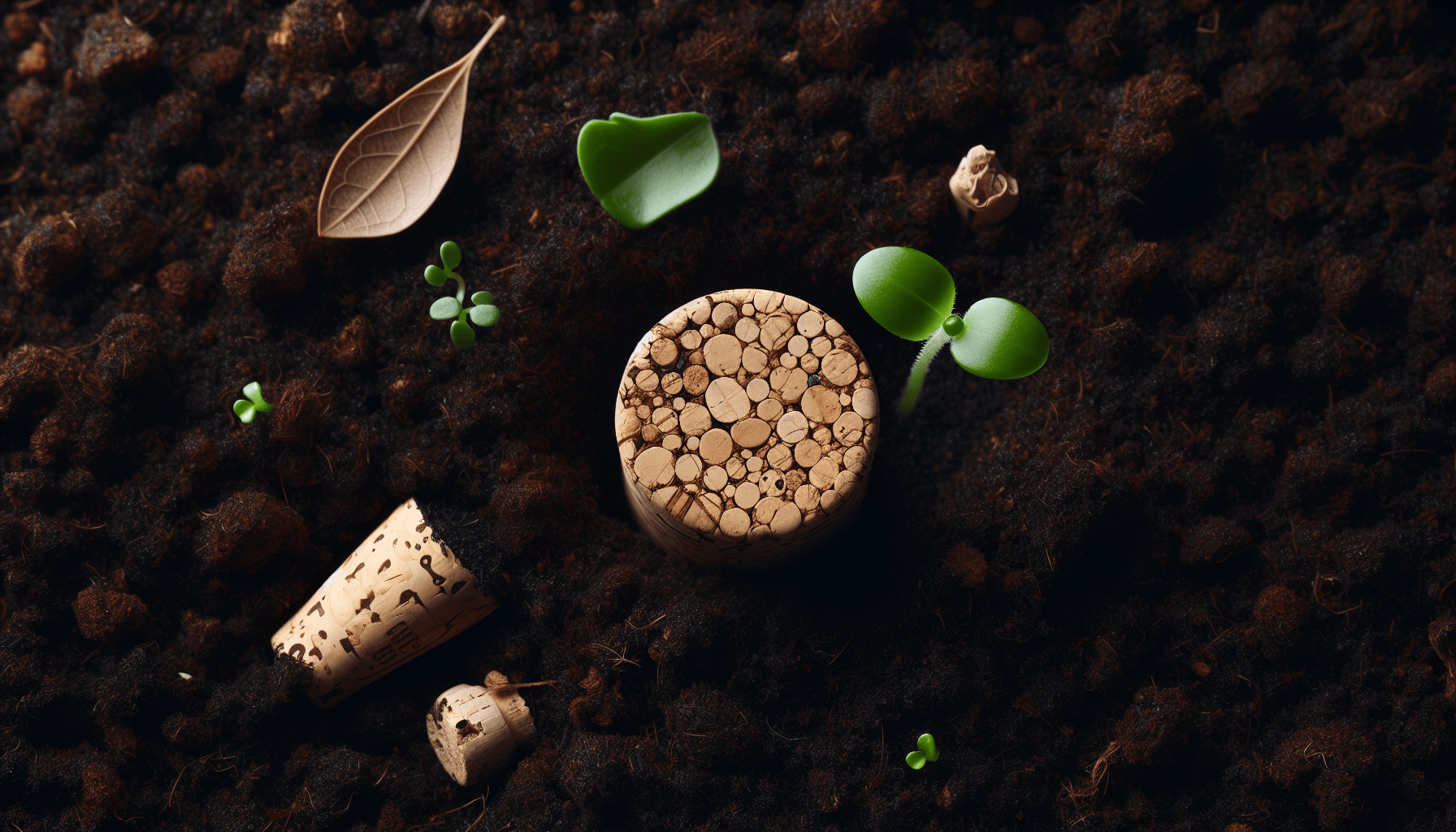Let’s dive into the world of sustainable living by discussing an often-overlooked item—wine corks. Many of us enjoy a good bottle of wine now and then, but have we ever paused to consider what happens to the cork once the bottle is empty? Can we compost wine corks, or is this cherished memento destined for the trash? In this article, we’ll explore the eco-friendly options for disposing of your wine corks, offering tips on how to compost them effectively and why it matters for our planet.
In our everyday quest to live more sustainably, one small step can make a big difference. With wine corks, understanding whether they can be composted helps us make better choices for our environment. Let’s come together to discover just how these tiny plugs can contribute to our green routine. Can we compost wine corks? This question has probably crossed our minds at some point, especially as we stand with a glass in one hand and the cork in the other, pondering over our next eco-friendly move. With sustainability becoming an ever-important conversation, we find ourselves scrutinizing not just the materials we use but also what happens to them after they’ve served their purpose. So, let’s delve into the nitty-gritty of whether or not wine corks belong in our compost bins.
Can I Compost Wine Corks?
Understanding Wine Corks
Types of Wine Corks
Before we determine if wine corks can be composted, it’s crucial to understand the different types of wine corks available:
| Type | Description |
|---|---|
| Natural Cork | Made from the bark of cork oak trees, these are the traditional wine corks. They are biodegradable and eco-friendly. |
| Synthetic Cork | Composed of plastic-based materials, these mimic natural corks but are not biodegradable. |
| Agglomerated Cork | Made from granulated natural cork bonded with adhesives, they offer a recycled approach but may have non-compostable elements. |
Knowing what each type of cork is made from can guide us in making environmentally responsible decisions.
Benefits of Cork
Natural cork brings several ecological benefits to the table. Cork oak trees, primarily found in Mediterranean regions like Portugal and Spain, don’t need to be cut down for harvest. Instead, the bark is stripped in a process that leaves the tree intact, allowing it to continue growing. Each time the bark is harvested, it regenerates, capturing more carbon dioxide and enhancing biodiversity.
Composting Basics
What is Composting?
Composting is a natural process of recycling organic matter, such as leaves and food scraps, into a valuable fertilizer that can enrich soil and plants. The composting process involves microorganisms breaking down organic materials in the presence of oxygen, resulting in a nutrient-rich end product often referred to as ‘black gold’ by gardeners.
What Can Be Composted?
Generally, compostable items fall into two categories:
| Type | Examples |
|---|---|
| Green Materials | Fruit scraps, vegetable peels, coffee grounds, and grass clippings. |
| Brown Materials | Fallen leaves, straw, cardboard, and wood chips. |
The Three Key Ingredients
For effective composting, we need three key components:
- Browns: Carbon-rich materials such as dried leaves and branches.
- Greens: Nitrogen-rich materials, such as grass clippings and kitchen waste.
- Water: Adequate moisture to maintain activity in the compost pile.
Balancing these ingredients ensures a healthy composting environment.

Is Composting Wine Corks Possible?
Composting Natural Corks
The good news is, natural wine corks are compostable! Made from 100% cork oak bark, they are a natural, biodegradable material. However, they do require a bit of preparatory work:
Steps to Compost Natural Corks:
- Clean the Cork: Make sure the cork is free of any synthetic materials or foil.
- Shred the Cork: Cutting or shredding the cork into smaller pieces speeds up the decomposition process.
- Add to Compost: Combine the cork pieces with other brown materials in your compost bin.
Natural cork takes some time to break down, so patience is essential.
Considerations for Agglomerated Corks
Agglomerated corks are a mixed bag. While they contain natural cork particles, they are often held together by non-biodegradable adhesives. We need to check the label or contact the manufacturer to determine if the specific cork can be composted.
Challenges with Synthetic Corks
Synthetic corks, typically made from plastic or rubber, are not compostable. They don’t break down in a composting environment and should be disposed of in your regular recycling bin, provided they are recyclable. Otherwise, these corks might end up in landfills, which we want to avoid.
Alternative Uses for Wine Corks
Even if composting isn’t always an option, there are numerous creative ways to repurpose wine corks.
Craft Projects
Wine corks can be transformed into a wide array of craft projects:
- Coasters: Arrange sliced corks in a circle or square and glue them together to create a rustic coaster.
- Cork Boards: Glue corks onto a board to create a personalized corkboard for notes and pictures.
- Keychains: Attach a jump ring and keychain hardware to a cork for a unique and buoyant keychain.
Gardening Uses
Outdoor enthusiasts and gardeners can also make good use of wine corks:
- Mulch: Shred corks to use as mulch around your plants, which helps retain soil moisture.
- Garden Markers: Write plant names on corks and attach them to sticks to label your garden crops.
Household Hacks
Beyond crafts and gardening, wine corks can serve several practical uses:
- Fire Starters: Soak corks in rubbing alcohol to create efficient fire starters.
- Furniture Pads: Cut corks into thin slices to make pads for the bottom of furniture legs, preventing floor scratches.

Environmental Impact of Wine Corks
Carbon Footprint
Natural corks have a lower carbon footprint compared to their synthetic counterparts. The process of harvesting cork is sustainable and helps maintain cork forests, which are crucial for carbon sequestration. Choosing wine with natural corks supports this eco-friendly practice.
Economic and Social Benefits
The cork industry provides employment in rural Mediterranean communities, supporting local economies and traditional practices. By selecting natural cork, we contribute positively to these regions.
How to Identify Compostable Corks
Checking Labels
When purchasing wine, look for bottles that specify the type of cork used. Many winemakers highlight the use of natural, eco-friendly corks. Some labels might even mention if their corks are compostable or made from sustainably harvested cork.
Contacting Manufacturers
If in doubt, don’t hesitate to contact the winery or cork manufacturer. They can provide detailed information about the materials used, allowing us to make informed decisions about composting or recycling.

Best Practices for Eco-Friendly Consumption
Mindful Purchasing
Making conscious choices can significantly reduce our environmental footprint:
- Choose Natural Cork: Opt for wines with natural cork stoppers over synthetic ones.
- Support Eco-Friendly Brands: Look for wineries that prioritize sustainability in their practices.
Responsible Disposal
When it’s time to part with the wine cork:
| Cork Type | Disposal Method |
|---|---|
| Natural Cork | Compost after shredding. |
| Agglomerated Cork | Compost if verified compostable; otherwise, recycle. |
| Synthetic Cork | Recycle if possible; otherwise, dispose of in trash. |
The Role of Recycling Programs
Some regions have specific recycling programs for wine corks. Organizations like Cork ReHarvest and Recork accept cork donations and repurpose them into various products, reducing waste and supporting a circular economy.
Frequently Asked Questions
How Long Does it Take for Natural Cork to Decompose?
In a composting environment, natural cork can take up to 3 years to fully break down. Shredding the cork into smaller pieces can accelerate this process.
Can I Mix Cork Dust in My Garden Soil?
Yes, cork dust can enrich the soil with organic matter. However, ensure it is free from any non-biodegradable elements before mixing it into your garden.
Are There Any Risks in Composting Corks?
If not cleaned properly, corks with synthetic materials, foil, or adhesives can contaminate your compost. It’s essential to verify the compostability of the corks before adding them to your compost bin.

Conclusion
So, can we compost wine corks? The answer is nuanced. Natural corks are compostable and provide a sustainable option if processed correctly. On the other hand, synthetic corks should be recycled, and agglomerated corks need verification before composting. Understanding the type of cork and its environmental impact helps us make eco-friendlier choices.
Composting wine corks can be part of our broader goal to live sustainably. By educating ourselves and implementing small yet meaningful changes, we contribute positively to the environment. The next time we pop a wine cork, let’s raise our glasses to mindful consumption and responsible disposal. Cheers to a greener future!



